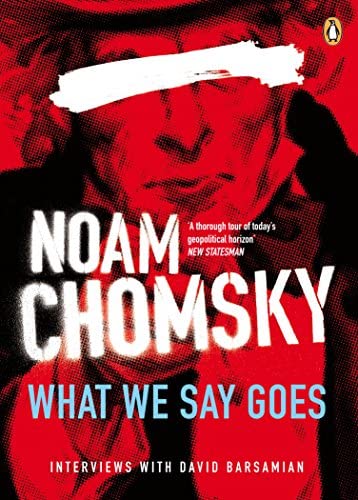Newly released
This book is new and will be uploaded as soon as it becomes available to us and if we secure the necessary publishing rights.

What we say goes Book PDF
(0)
Author:
Noam ChomskyNumber Of Reads:
67
Language:
English
Category:
fieldsSection:
Pages:
223
Quality:
excellent
Views:
878
Quate
Review
Save
Share
Book Description
What we say goes: conversations on U.S. power in a changing world
The world's foremost critic of US foreign policy, Noam Chomsky explores the most immediate and urgent concerns in the world and shows how they affect us all. They include Iran's challenge to the United States, the deterioration of the Israel-Palestine conflict, the ongoing occupations of Iraq and Afghanistan, the rise of China, and the growing power of the left in Latin America, as well as the increasing influence of the Democrats in US politics and its ramifications for the future. As always, Chomsky presents his ideas vividly and accessibly, with uncompromising principle and penetrating insight. The latest volume from a long-established partnership, What We Say Goes shows once again that no interviewer engages with Noam Chomsky more effectively than David Barsamian. These interviews will inspire a new generation of readers, as well as long-time Chomsky fans eager for his latest thinking on the many crises we now confront. Noam Chomsky is one of the most influential political thinkers of our time. He is the author of numerous bestselling political works, including Manufacturing Consent, Hegemony or Survival, and Failed States. He is Professor of Linguistics and Philosophy at Massachusetts Institute of Technology. David Barsamian is the producer of the award-winning syndicated US radio program Alternative Radio. His interviews with Chomsky formed the basis of the recent book, Imperial Ambitions.
Noam Chomsky
Fram Noam Chomsky (born December 7, 1928 Philadelphia, Pennsylvania) is an American professor of linguist and philosopher, as well as cognitive scientist, logician, historian, critic, and political activist. He is Professor Emeritus of Linguistics in the Department of Linguistics and Philosophy at MIT, where he has worked for more than 50 years. In addition to his work in linguistics, Chomsky has written on war, politics, and the media and is the author of more than 100 books. According to the 1992 Art and Human Sciences Reference List, Chomsky was cited more than any living scholar from 1980 to 1992, and ranked as the eighth most cited reference ever in a list that includes the Bible, Karl Marx, and others. Chomsky has been described as a cultural preeminent, having been voted as the "world's leading intellectual" in a 2005 poll. Chomsky is also described as the "father of modern linguistics" and is considered a major figure in analytic philosophy. His work has influenced fields such as computer science, mathematics, and psychology. . He is also credited with establishing the theory of generative grammar, which is often considered the most important contribution to the field of theoretical linguistics in the twentieth century. He is also credited with establishing what became known as the Chomsky hierarchy, the theory of universal grammar, and the Chomsky-Schützenberger theory. After the publication of his first book on linguistics, Chomsky became a prominent critic of the Vietnam War and has since continued to publish his critical books on politics. He is best known for his criticism of US foreign policy, state capitalism, and the general news media. His criticism of the media, which he co-wrote with Edward Hermann, is included in The Deference Industry: The Political Economy of Mass Media (1988) is an analysis that crystallizes a theory of the propaganda model for the study of media. Chomsky describes his views as "fairly anarcho-traditionalism with its origins in the Enlightenment and classical liberalism" sometimes identified with anarcho-syndicalism and libertarian socialism. He is also considered a key theoretician of the left wing of American politics. He is also credited with establishing what became known as Chomsky's hierarchy, a classification of formal languages according to their generative capacity. In addition to his work in linguistics, Chomsky is widely known as a political activist, and for his criticism of the foreign policy of the United States and other governments. Chomsky describes himself as a libertarian socialist, a sympathetic anarchist who is a member of the world's industrial workers' union and is often considered a key theorist of the left wing of American politics. According to the Arts and Humanities Reference Index, between 1980 and 1992 Chomsky was cited as a reference more than any other living person, and as the eighth person ever.
Book Currently Unavailable
This book is currently unavailable for publication. We obtained it under a Creative Commons license, but the author or publisher has not granted permission to publish it.
Rate Now
5 Stars
4 Stars
3 Stars
2 Stars
1 Stars
What we say goes Quotes
Top Rated
Latest
Quate
Be the first to leave a quote and earn 10 points
instead of 3
Comments
Be the first to leave a comment and earn 5 points
instead of 3